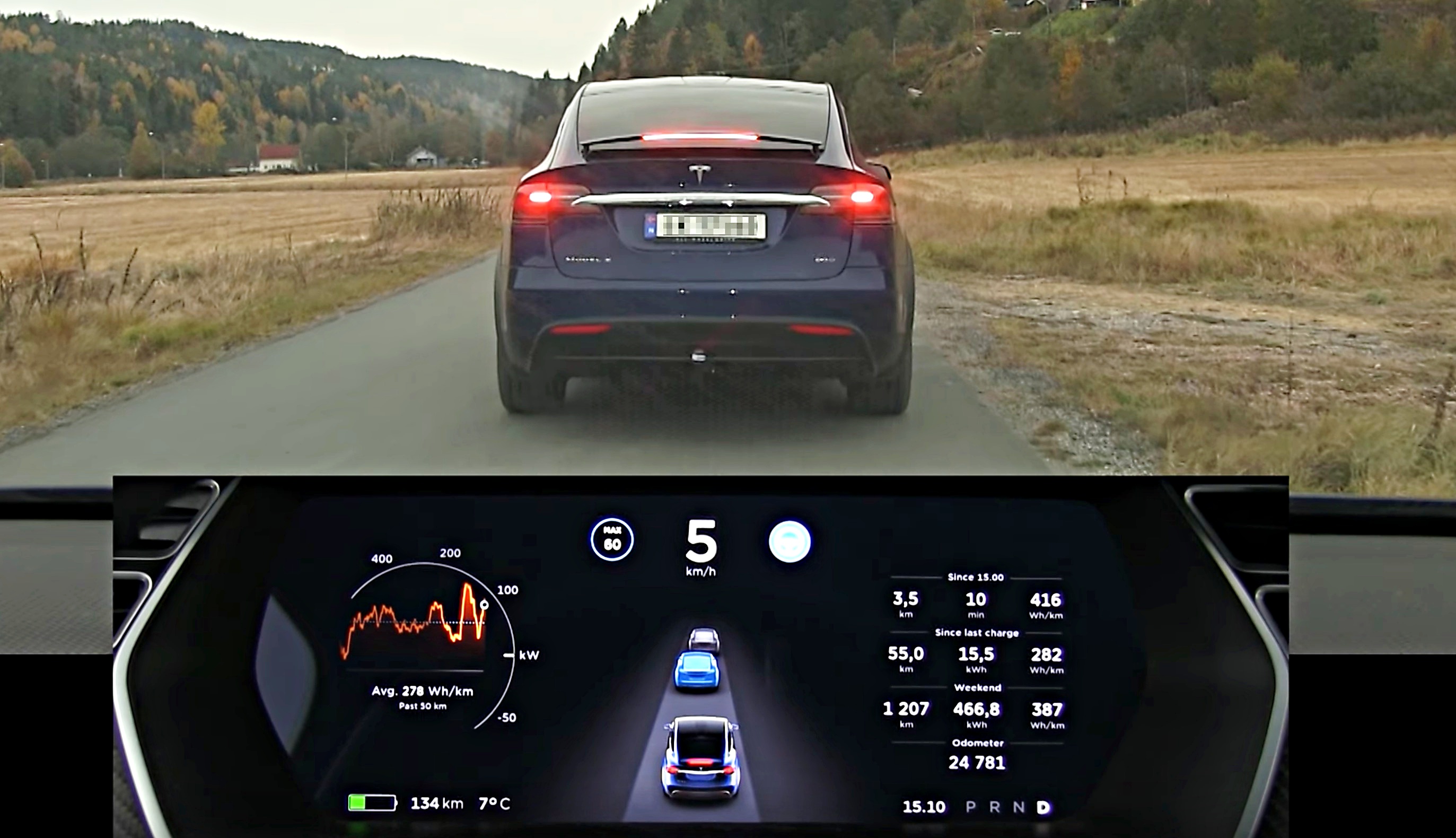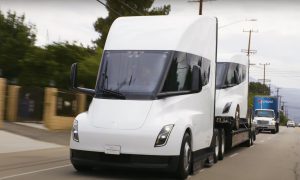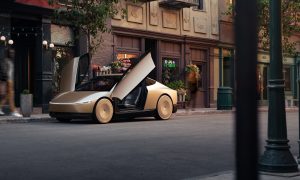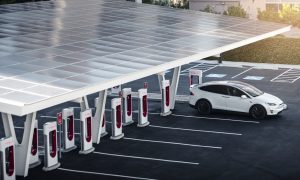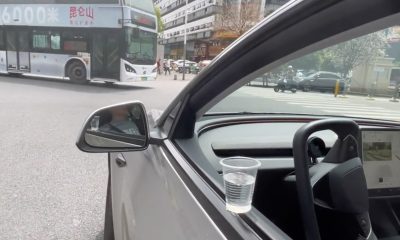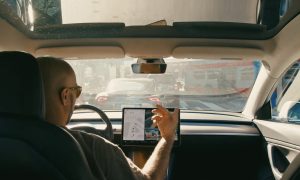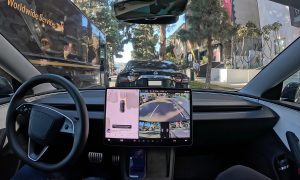In its latest report on automatic emergency braking (AEB) standards for automakers, the National Highway Traffic Safety Administration (NHTSA) and the Insurance Institute for Highway Safety (IIHS) have announced that Tesla is one of only four manufacturers so far that has reached the goal of supplying AEB on more than half of its produced vehicles in model year 2017. This first manufacturer’s report on the voluntary crash avoidance standard lists four manufacturers offering AEB on more than half and another seven with the tech on more than thirty percent of their 2017 model year vehicles.
The initiative was first announced in 2015 with a total of ten automakers on board, including Tesla. Other automakers at that time included Audi, BMW, Ford, General Motors, Mazda, Mercedes-Benz, Toyota, Volkswagen, and Volvo. A year later, an additional ten manufacturers joined. The initiative’s goal is to get manufacturer’s voluntarily on board to make forward collision warning (FCW) systems and automatic emergency braking standard equipment on all vehicles manufactured by September 1, 2022, about the time that model year 2023 vehicles would be entering production. The initiative further pushes for all trucks in the medium-duty sector (8,501 to 10,000 pounds gross vehicle weight) to meet the same standard by 2025.
Recently, manufacturers submitted their first yearly progress reports to the IIHS-NHTSA consortium for vehicles manufactured between September 1, 2016 and August 31, 2017 for the U.S. market. Tesla had the largest proportion of its vehicles including the technology for 2017, with all but only a handful of manufactured vehicles having AEB and FCW. This despite many having AEB deactivated for a portion of the year due to glitches with its sensitivity levels. The feature was reactivated in late April and early May as a software update.
For reference, the IIHS-NHTSA report states that Consumer Reports, which assists in monitoring progress towards compliance with the initiative, found that only 19 percent of 2017 model year vehicles include AEB and FCW as standard equipment. Most of those vehicles, like the Model S and Model X being reported by Tesla, are classified as luxury vehicles by price point.
The IIHS and NHTSA estimate that if the commitment by manufacturers to meet the initiative’s standards are met by 2025, a total of 28,000 crashes and 12,000 injuries will be prevented. Total commitment so far from manufacturers in the U.S. market account for over 99 percent of the vehicles sold in the country.
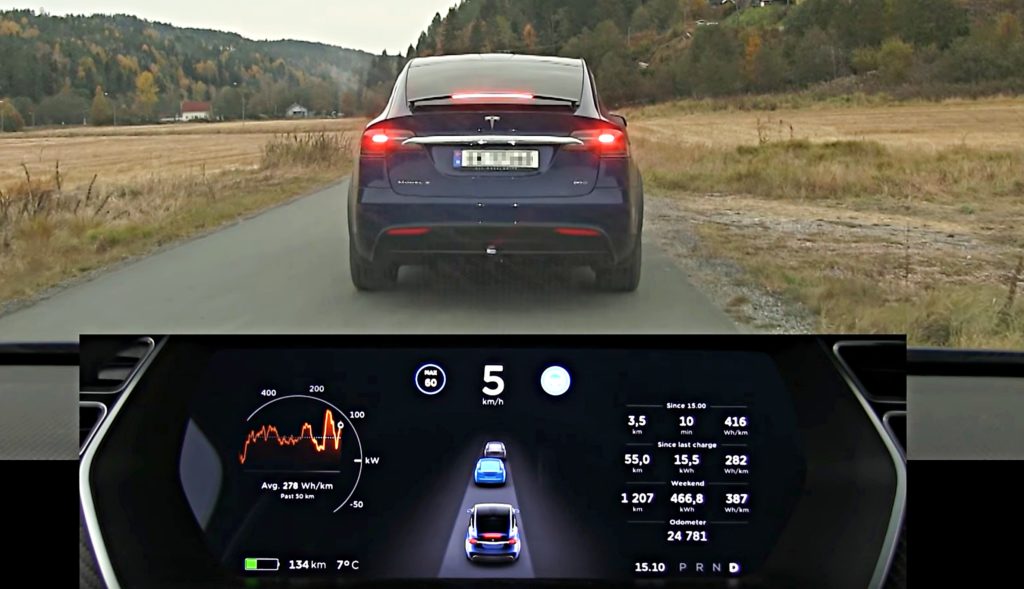
Tesla Model X response test for Autopilot vehicle detection [Credit: Bjørn Nyland]
Systems conforming with the vehicle standard must come with FCW that meets 2 of the 3 NHTSA 5-Star Safety Ratings’ requirements and AEB that earns at least an “Advanced” rating from the IIHS. The four complying automakers who’ve met the standard in more than fifty percent of manufactured 2017 models include Audi (73%), Mercedes-Benz (96%), and Volvo (68%) alongside Tesla (99.8%).
Other manufacturers have lower numbers, but a fast-growing commitment to the standard. Toyota at 56 percent accounts for the largest total volume of vehicles equipped to meet the initiative’s requirements with General Motors, at 20 percent, following closely behind. Lowest on the list of compliance were Fiat Chrysler, Ford, Hyundai, Kia, and Mitsubishi. Of luxury makes, only Jaguar Land Rover and Porsche don’t offer the technologies at all in 2017 model year vehicles counted.
News
Tesla cleared in Canada EV rebate investigation
Tesla has been cleared in an investigation into the company’s staggering number of EV rebate claims in Canada in January.

Canadian officials have cleared Tesla following an investigation into a large number of claims submitted to the country’s electric vehicle (EV) rebates earlier this year.
Transport Canada has ruled that there was no evidence of fraud after Tesla submitted 8,653 EV rebate claims for the country’s Incentives for Zero-Emission Vehicles (iZEV) program, as detailed in a report on Friday from The Globe and Mail. Despite the huge number of claims, Canadian authorities have found that the figure represented vehicles that had been delivered prior to the submission deadline for the program.
According to Transport Minister Chrystia Freeland, the claims “were determined to legitimately represent cars sold before January 12,” which was the final day for OEMs to submit these claims before the government suspended the program.
Upon initial reporting of the Tesla claims submitted in January, it was estimated that they were valued at around $43 million. In March, Freeland and Transport Canada opened the investigation into Tesla, noting that they would be freezing the rebate payments until the claims were found to be valid.
READ MORE ON ELECTRIC VEHICLES: EVs getting cleaner more quickly than expected in Europe: study
Huw Williams, Canadian Automobile Dealers Association Public Affairs Director, accepted the results of the investigation, while also questioning how Tesla knew to submit the claims that weekend, just before the program ran out.
“I think there’s a larger question as to how Tesla knew to run those through on that weekend,” Williams said. “It doesn’t appear to me that we have an investigation into any communication between Transport Canada and Tesla, between officials who may have shared information inappropriately.”
Tesla sales have been down in Canada for the first half of this year, amidst turmoil between the country and the Trump administration’s tariffs. Although Elon Musk has since stepped back from his role with the administration, a number of companies and officials in Canada were calling for a boycott of Tesla’s vehicles earlier this year, due in part to his association with Trump.
News
Tesla Semis to get 18 new Megachargers at this PepsiCo plant
PepsiCo is set to add more Tesla Semi Megachargers, this time at a facility in North Carolina.

Tesla partner PepsiCo is set to build new Semi charging stations at one of its manufacturing sites, as revealed in new permitting plans shared this week.
On Friday, Tesla charging station scout MarcoRP shared plans on X for 18 Semi Megacharging stalls at PepsiCo’s facility in Charlotte, North Carolina, coming as the latest update plans for the company’s increasingly electrified fleet. The stalls are set to be built side by side, along with three Tesla Megapack grid-scale battery systems.
The plans also note the faster charging speeds for the chargers, which can charge the Class 8 Semi at speeds of up to 1MW. Tesla says that the speed can charge the Semi back to roughly 70 percent in around 30 minutes.
You can see the site plans for the PepsiCo North Carolina Megacharger below.

Credit: PepsiCo (via MarcoRPi1 on X)

Credit: PepsiCo (via MarcoRPi1 on X)
READ MORE ON THE TESLA SEMI: Tesla to build Semi Megacharger station in Southern California
PepsiCo’s Tesla Semi fleet, other Megachargers, and initial tests and deliveries
PepsiCo was the first external customer to take delivery of Tesla’s Semis back in 2023, starting with just an initial order of 15. Since then, the company has continued to expand the fleet, recently taking delivery of an additional 50 units in California. The PepsiCo fleet was up to around 86 units as of last year, according to statements from Semi Senior Manager Dan Priestley.
Additionally, the company has similar Megachargers at its facilities in Modesto, Sacramento, and Fresno, California, and Tesla also submitted plans for approval to build 12 new Megacharging stalls in Los Angeles County.
Over the past couple of years, Tesla has also been delivering the electric Class 8 units to a number of other companies for pilot programs, and Priestley shared some results from PepsiCo’s initial Semi tests last year. Notably, the executive spoke with a handful of PepsiCo workers who said they really liked the Semi and wouldn’t plan on going back to diesel trucks.
The company is also nearing completion of a higher-volume Semi plant at its Gigafactory in Nevada, which is expected to eventually have an annual production capacity of 50,000 Semi units.
Tesla executive teases plan to further electrify supply chain
News
Tesla sales soar in Norway with new Model Y leading the charge
Tesla recorded a 54% year-over-year jump in new vehicle registrations in June.

Tesla is seeing strong momentum in Norway, with sales of the new Model Y helping the company maintain dominance in one of the world’s most electric vehicle-friendly markets.
Model Y upgrades and consumer preferences
According to the Norwegian Road Federation (OFV), Tesla recorded a 54% year-over-year jump in new vehicle registrations in June. The Model Y led the charge, posting a 115% increase compared to the same period last year. Tesla Norway’s growth was even more notable in May, with sales surging a whopping 213%, as noted in a CNBC report.
Christina Bu, secretary general of the Norwegian EV Association (NEVA), stated that Tesla’s strong market performance was partly due to the updated Model Y, which is really just a good car, period.
“I think it just has to do with the fact that they deliver a car which has quite a lot of value for money and is what Norwegians need. What Norwegians need, a large luggage space, all wheel drive, and a tow hitch, high ground clearance as well. In addition, quite good digital solutions which people have gotten used to, and also a charging network,” she said.
Tesla in Europe
Tesla’s success in Norway is supported by long-standing government incentives for EV adoption, including exemptions from VAT, road toll discounts, and access to bus lanes. Public and home charging infrastructure is also widely available, making the EV ownership experience in the country very convenient.
Tesla’s performance in Europe is still a mixed bag, with markets like Germany and France still seeing declines in recent months. In areas such as Norway, Spain, and Portugal, however, Tesla’s new car registrations are rising. Spain’s sales rose 61% and Portugal’s sales rose 7% last month. This suggests that regional demand may be stabilizing or rebounding in pockets of Europe.
-

 Elon Musk2 weeks ago
Elon Musk2 weeks agoTesla investors will be shocked by Jim Cramer’s latest assessment
-

 Elon Musk2 days ago
Elon Musk2 days agoxAI launches Grok 4 with new $300/month SuperGrok Heavy subscription
-

 Elon Musk4 days ago
Elon Musk4 days agoElon Musk confirms Grok 4 launch on July 9 with livestream event
-

 News1 week ago
News1 week agoTesla Model 3 ranks as the safest new car in Europe for 2025, per Euro NCAP tests
-

 Elon Musk2 weeks ago
Elon Musk2 weeks agoA Tesla just delivered itself to a customer autonomously, Elon Musk confirms
-

 Elon Musk1 week ago
Elon Musk1 week agoxAI’s Memphis data center receives air permit despite community criticism
-

 News2 weeks ago
News2 weeks agoXiaomi CEO congratulates Tesla on first FSD delivery: “We have to continue learning!”
-

 Elon Musk1 week ago
Elon Musk1 week agoTesla scrambles after Musk sidekick exit, CEO takes over sales

